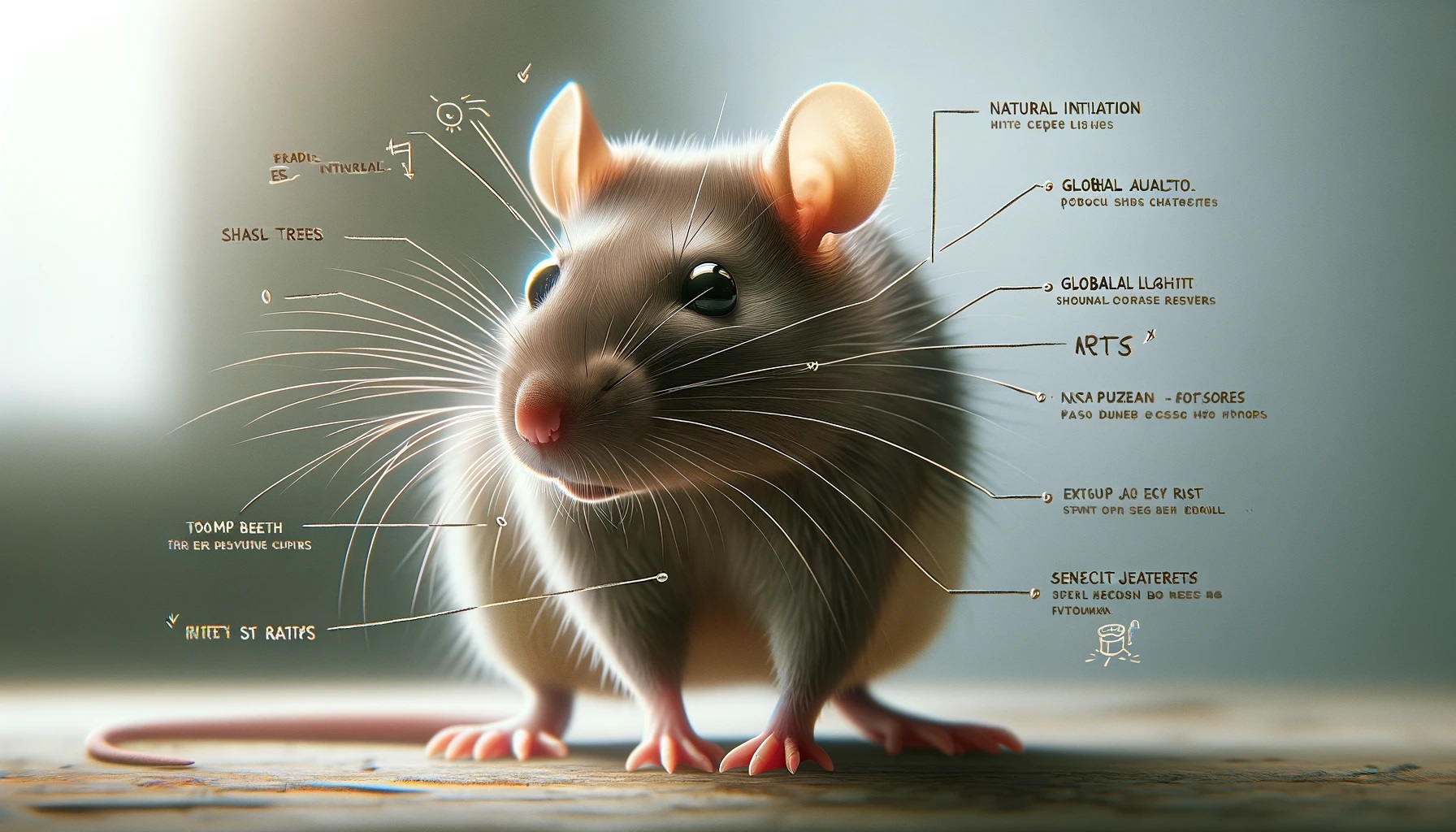Introduction
Do rats run towards you or do they flee when confronted by humans? This common question taps into the ambiguous relationship humans have with rats. Despite their often negative image, rats exhibit a wide range of behaviors, from the gentle and sociable to the more defensive. Physically, rats possess distinct traits such as a long tail, pointy nose, and sharp teeth for gnawing, which not only aid in their survival but also facilitate their notorious reputation as pests. These features enable them to forage efficiently, burrow into narrow spaces, and contaminate food sources, often leading to significant human health concerns.
From a behavioral perspective, rats are complex creatures. Known for their intelligence and social structures, these nocturnal animals are highly adaptable to various environments. Their ability to learn quickly and communicate through various means makes them fascinating subjects of study. However, when rats feel threatened or cornered, they may attack, leading to instances of rat bites. Understanding these aspects is crucial, especially when considering rat control methods that focus on exclusion and habitat management to prevent infestations. Rats are often misunderstood, and while they can be friendly and empathetic toward their own kind, their interactions with humans can vary greatly depending on the circumstances.
Key Takeaways
- Rats have distinct physical features such as a long tail, pointy nose, and sharp teeth which help them adapt to various environments and access food sources.
- As nocturnal creatures, rats exhibit complex behavioral traits including high intelligence, social structures, and problem-solving abilities, which make them both fascinating and challenging to manage.
- Rats can be friendly and empathetic towards their own kind, capable of forming strong bonds and demonstrating care within their communities.
- However, when threatened or cornered, rats may attack, leading to potential rat bites, highlighting the need for careful interaction and management.
- Rats are considered pests due to their ability to contaminate food and transmit diseases like leptospirosis and hantavirus, necessitating effective rat control measures.
- Preventive measures and rat control methods such as exclusion, habitat management, and rodent control are essential to manage rat populations and minimize risks.
Characteristics Between Mouse And Rat Behaviour Related Posts
When comparing rats and mice, it’s crucial to recognize that rats are typically larger and possess a more robust build than mice. Roof rats, known for their agility, are excellent climbers and often come into contact with human habitats through openings in the upper parts of buildings. Both rats and mice are nocturnal, actively looking for food during the night, which can often provoke situations where they may bite if cornered or trapped. In terms of behavior, rats are known to be more territorial and can cause damage through their need to gnaw, especially when they dispose of their droppings and litter in hidden areas. Understanding these differences between mice and rats is vital for effective rodent control methods.
Physical features of rats
Rats have distinct physical features that set them apart. They typically have a long tail, a pointy nose, and sharp teeth designed for gnawing. These characteristics enable them to navigate through small spaces and access food sources. Rats are also known for their ability to climb walls and swim, making them highly adaptable creatures. Their physical attributes make them effective survivors in various environments.
Behavioral traits of rats
Rats have a wide range of behavioral traits that make them fascinating creatures. They are highly intelligent and can learn complex tasks quickly. Rats are social animals and often live in groups, displaying hierarchical structures within their communities. They communicate through various vocalizations, body language, and even scent marking. Rats exhibit exploratory behavior, constantly seeking out new environments and objects to investigate. Additionally, they are excellent problem solvers and can adapt to changing circumstances. Understanding these behavioral traits is important for effectively interacting with rats and providing appropriate care.
Questions about Rat as Friends Inclination of Public Health
Despite common misconceptions, rats can positively influence public health by reducing waste as they scavenge pet food, leftover bagels, and other discarded items. They play a crucial role in the urban ecosystem, although their presence raises frequently asked questions about potential health risks. Rats have been known to exhibit complex rat behavior, including empathy and social interactions that contradict their typical portrayal as mere pests. Centers for Disease Control and pest control companies often address concerns by promoting proper sanitation and safe removal methods to prevent rats from becoming a public health issue. Their misunderstood nature and the benefits they can offer remind us that mice or rats are not just pests but part of our urban wildlife.
Can rats be affectionate towards humans? Yes, rats are known for their social and affectionate nature towards both their own species and humans. They are capable of forming strong bonds with their owners and can demonstrate empathy, making them engaging and responsive companions.
What are the benefits of having rats as pets? Keeping rats as pets can offer several benefits. They are intelligent, can learn tricks, and are known for their playful and affectionate demeanor. Rats are also relatively low maintenance and do not require as much space as other pets, making them suitable for various living situations. Their interaction can positively impact mental health by providing companionship and reducing feelings of loneliness.
What should potential rat owners consider about their health? While rats provide many benefits, potential owners should be aware of the health risks associated with keeping them. Rats are prone to certain diseases and require attentive care and regular veterinary check-ups to manage health issues such as respiratory infections and tumors. Prospective rat owners should be prepared for the possibility of frequent vet visits and the associated costs.
How long do pet rats typically live? Pet rats generally have a short lifespan, averaging about 2 to 3 years. This short lifespan can be emotionally challenging for owners as they may form deep bonds with their pets. Good care can sometimes extend their lives slightly, but owners should be prepared for their relatively brief lifespan compared to other pets.
These points provide a rounded view of what it entails to have rats as pets and their impact on public health through companionship and waste reduction. If you’re considering a rat as a pet, these aspects can help you make an informed decision about whether this pet is suitable for your lifestyle and expectations.
Instances of rats being friendly and helpful
Instances of rats being friendly and helpful include their ability to form strong bonds with their owners and other rats, as well as their empathetic nature towards injured pack members. Rats are highly intelligent and can be trained to perform tricks and tasks, bringing joy and companionship to their owners. These social animals seek out human interaction and provide a unique bond that is cherished by many rat owners. They demonstrate care and empathy, proving that rats can be wonderful friends and companions. Notably, rats are nocturnal, meaning they are most active at night, which adds a fascinating aspect to their care. Species of rats vary, each with unique traits that can influence their behavior and interactions.
Benefits of keeping rats as pets
Rats make wonderful pets due to a variety of benefits. Firstly, they are highly intelligent creatures that can be trained to perform tricks and tasks, providing endless entertainment for their owners. Additionally, rats form strong bonds with their owners and other rats, offering companionship and a sense of belonging. They are also empathetic towards injured pack members, displaying care and support within their social groups. This care often extends to dealing with any rat problem efficiently. Their rat’s tail is just one distinctive physical trait that adds to their unique charm. Overall, keeping rats as pets can bring joy, love, and a unique friendship that is cherished by many rat owners.
Rats Habitat as Pests Calling in the Pest Control
When rats become pests, their potential to harm health and property becomes a significant concern, necessitating professional help from pest control companies. Rats, especially the brown rat, are known to attack wiring and insulation, leading to costly damages. They are active at night, scurrying and producing squeaks that can disturb residents. Effective strategies to attract rats to traps and bait stations include understanding their habits as mammals that feel threatened or provoked. Pest control companies often work to remove these pests safely, emphasizing disease control and prevention to mitigate health risks. CDC guidelines recommend maintaining clean environments to reduce these invasions.
Health risks associated with rats
Rats can also be considered pests due to the health risks they pose and the damage they can cause. These rodents carry diseases such as leptospirosis, salmonella, and hantavirus, which can be transmitted to humans through contact with their urine, feces, or bites. Additionally, rats have a penchant for chewing on electrical wires, causing potential fire hazards and costly property damage. It is crucial to take preventive measures such as sealing entry points and maintaining cleanliness to deter rats from infiltrating homes. Effective pest control methods, such as traps and professional extermination services, may be necessary to eliminate rat infestations. Rat species vary, and understanding their specific behaviors is essential for effective control.
Property damage caused by rats
Rats can also cause significant property damage. They have a habit of gnawing on electrical wires, which can lead to potential fire hazards. Additionally, rats can chew through insulation, wood, and other building materials, causing structural damage to homes and buildings. It is crucial to address rat infestations promptly to prevent further damage and potential safety risks. Taking preventive measures such as sealing entry points and using traps or professional extermination services can help mitigate property damage caused by rats.
Rat Infestation And Rat Control Methods
Effective rat control methods involve a strategic approach to ensure that rats are not only removed but also prevented from returning. Sealing entry points and ensuring cleanliness is crucial to deter rats. Trapping is a commonly used method; setting up traps where rats are likely to flee can significantly reduce their numbers. In more severe cases, professional extermination services are recommended. These services often use integrated pest management techniques that may include environmental modification to kill and eat the food sources of rats. Always choose a reputable service if you recommend this company for pest control solutions.
“Effective rat control is not just about elimination but also about prevention. Ensuring that entry points are sealed, food sources secured, and potential nesting sites are cleared is crucial. In cases of severe infestations, professional extermination services become necessary to comprehensively address the problem and prevent future occurrences.”
Preventive measures to deter rats
Preventive measures can effectively deter rats from invading your property. Take the following steps to keep rats away:
- Seal all entry points, such as cracks and gaps in walls or floors.
- Secure food sources by storing them in rat-proof containers.
- Keep your surroundings clean and free of clutter, as rats are attracted to potential nesting sites.
- Regularly inspect and maintain your property to identify and address any potential rat entry points or infestations.
- Consider using scent-based deterrents like peppermint oil or ammonia, as rats dislike strong smells.
- Trim tree branches and shrubs near your property to eliminate potential pathways for rats.
Effective ways to exterminate rats
To effectively exterminate rats, there are several methods you can employ. One option is the use of traps, such as snap traps or glue boards, strategically placed in areas where rats are commonly seen. Another method is the use of rodenticides, but caution must be exercised to prevent harm to pets or children. Additionally, sealing off entry points and removing food sources can help deter rats from your property. If the infestation is severe, it may be necessary to seek professional pest control services for a more thorough extermination.
[lasso rel=”amazon-59″ id=”5558″]
Conclusion
As we examine whether rats attack humans or escape when approached, it’s evident that rats display a range of behaviors shaped by their surroundings and specific situations. These animals are nocturnal, most active after dark, which may lead to unexpected encounters that could provoke defensive reactions. Despite their often negative image, these creatures possess sophisticated rat species-specific traits and behaviors that often differ significantly from common perceptions.
Inquiries concerning the nature of rats often arise from their complex interactions with humans. Whether perceived as nuisances or potential companions, understanding these animals demands recognition of their inherent behaviors and ecological roles. Rats are more likely to be misunderstood than fully understood, highlighting the necessity for informed rat control strategies that prioritize both human and animal welfare. Their role in the ecosystem, ability to control pests, and their complex social structures make them intriguing subjects for ongoing study and discussion.













